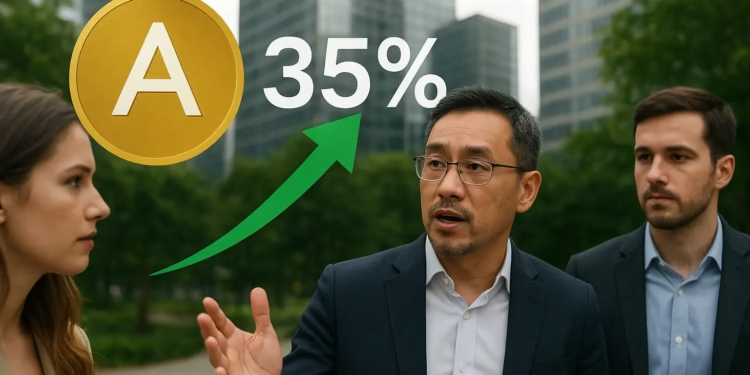Aster, a decentralized exchange backed by Binance founder Changpeng Zhao’s YZi Labs has postponed its Aster airdrop Stage 2 from October 14 to October 20, citing “potential data inconsistencies.”
The delay comes after users flooded the platform’s community channels with complaints about unexpectedly low token allocations. According to Aster’s announcement on X (formerly Twitter), the issue stems from mismatched snapshots and allocation errors identified after the launch of its “S2 airdrop checker.”
The Aster airdrop is a core part of the project’s user-reward program, designed to distribute tokens to active traders across multiple blockchains. However, many users discovered massive discrepancies between their trading volumes and assigned rewards. One participant reported receiving only 336 ASTER tokens despite recording over $9 million in trading volume.
“The team is actively reviewing all flagged cases to ensure fairness and consistency in allocations,” Aster wrote in its official statement. “Our priority is to maintain user trust and the integrity of the airdrop distribution.”
Data inconsistencies prompt community concern
In its Friday update, Aster explained that the postponement was necessary to “revalidate the data pipeline” used to generate user snapshots for the Aster airdrop. The platform clarified that the inconsistencies were not systemic but could affect a subset of users whose trading histories were inaccurately recorded.
While Aster reassured that “most users’ allocations will remain unaffected,” the lack of detailed explanation has stirred uncertainty within the community. Several users have called for an independent audit of the allocation mechanism before the rescheduled October 20 drop.
Airdrops are meant to reward engagement, not frustrate loyal traders, said Vincent Liu, Chief Investment Officer at Kronos Research, in a statement to Cointelegraph. When inconsistencies appear, projects must over-communicate transparency especially when large trading volumes and user trust are on the line.
Aster also confirmed that future airdrop checkers will include an on-chain verification component to prevent similar mismatches. The team emphasized that no user will receive less than their “final snapshot ratio” per epoch once recalculations are complete.
Aster’s rise and competitive positioning
The controversy over the Aster airdrop comes at a pivotal moment for the exchange. Originally branded as APX Finance, Aster has rapidly positioned itself as a cross-chain perpetual futures DEX, challenging established players like Hyperliquid and dYdX.
Operating across Ethereum, BNB Chain, Arbitrum, and Solana, Aster recorded over $420 billion in trading volume last month, according to data from DeFiLlama. The exchange’s Stage 1 airdrop in September helped fuel this growth, attracting more than 150,000 new wallets and cementing its place among top-tier decentralized derivatives platforms.
The postponed Aster airdrop also known as Stage 2 was expected to distribute tokens to over 153,000 qualifying wallets, rewarding loyal users based on activity, liquidity provision, and referral participation. Analysts viewed the airdrop as a key driver of engagement and market share expansion ahead of Aster’s roadmap milestones for Q4 2025.
Community rewards have become a powerful liquidity engine, said James Seyffart, ETF analyst at Bloomberg Intelligence. But when reward mechanisms stumble, even temporarily, it can dent short-term confidence in the platform’s internal governance.
Market reaction and next steps
Despite the setback, the Aster (ASTER) token has shown resilience. As of Wednesday, it traded near $1.69, down only 2.5% over the week, according to CoinMarketCap. Analysts attribute the token’s stability to sustained trading activity and investor confidence in Aster’s multi-chain expansion strategy.
A delay is better than a compromised distribution, said Lena Chen, blockchain strategist at Messari. The market has largely priced in minor operational hiccups, but prolonged silence could erode trust faster than price volatility.
To prevent speculation, Aster has committed to publishing an updated token allocation report and technical post-mortem by October 18 which is two days before the rescheduled Aster airdrop. The team also hinted at integrating a Merkle-proof verification system, enabling users to validate eligibility and token amounts on-chain.
The Aster airdrop controversy underscores a growing theme in decentralized finance: transparency is now a key competitive differentiator. With community trust hanging in the balance, the exchange’s ability to deliver a fair and verifiable distribution could determine whether Aster sustains its meteoric rise or faces a reputational drag in the months ahead.
Final thoughts
The rescheduled Aster airdrop on October 20 is shaping up to be a defining moment for the young DEX. While short-term turbulence has unsettled parts of the community, Aster’s swift response and promises of corrective measures suggest it intends to prioritize integrity over haste.
For crypto investors watching the DeFi landscape, the event serves as a reminder that in airdrop-driven ecosystems, trust is the true token of value.











